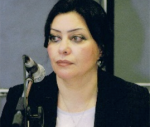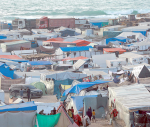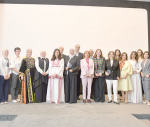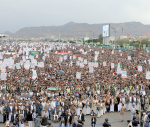You are here
Investigative journalism forum concludes with awards for reports on slavery, corruption, abuses
By Rana Husseini - Dec 04,2018 - Last updated at Dec 04,2018
DEAD SEA — Egyptian, Yemeni, Mauritanian and Palestinian journalists clinched top prizes for best investigation in film, multimedia and data journalism in 2018 at the Arab Reporters for Investigative Journalism (ARIJ).
The winners were announced at a gala dinner on Sunday night, concluding the 11th Forum for Arab Investigative Journalists, which commenced on Friday and was organised by ARIJ.
The winning journalists’ work exposed “human rights abuses, slavery and corruption in their countries, and frankly all the around 100 entries deserved to win,” said former media executive and columnist Mohammad Chebaro, who headed the ARIJ Jury Committee.
“The entries in all the categories showed a strong commitment by all the investigative journalists to expose abuse and corruption in various political, social and health sectors in their countries, despite repeated attempts to clamp down on freedom of expression by their regimes,” Chebaro told the around 475 Arab journalists from 18 nations and international trainers who attended the forum.
Egypt’s Ali Satouhi and Azzah Morsi won first prize in the Long-Form Investigations’ category for their report, “Under Experiment”, which exposed the clinical tests that were occurring due to “weak” monitoring by the government.
First prize for Short-Form Investigations was shared by two journalists from Yemen and Mauritania.
Mauritanian journalist Salek Zayed won the award for his in-depth report, “The Living Dead”, where he touched on reported slavery in his own country. Yemeni reporter Aseel Sariyah’s “The Journey of no Return”, which exposed the dilemmas of Yemeni fishermen captured by the Eritrean authorities, won the reporter the same award.
Egyptian journalist Aya Abdel Jawad clinched the Best
Digital Investigation award for her investigative report, “Raped Children who are Left without Psychological Counseling”.
Palestinian journalist Mahmoud Haniyah, from the Gaza Strip, won the Best Arab Investigation for his video, “Banned Fishing in Gaza: Who Shares the Catch?” His documentary tackled the “corrupt cooperation between police and the fishermen who catch tainted fish and sell it to consumers”.
The best Arab Data Investigation award went to Egypt’s Maha Rashed for her report, “Testing the Opposition in Parliament; Zero Result”. The report tackled the change in the performance of the oppositional deputies of the Egyptian parliament.
The two categories Best Environmental and Best Human Rights were cancelled this year due to lack of entries, according to Chebaro.
“Investigative Reporters and Editors [IRE] proudly supports the work that ARIJ and Arab journalists are doing in dangerous parts of the world. We celebrate all of your success!” said Executive Director for IRE Doug Haddix.
“Your work matters. Your stories make a difference. The network that you have built provides critical support and encouragement for journalists across the region,” Haddix added.
Formed in 1975, IRE is a grass-roots non-profit organisation dedicated to improving the quality of investigative reporting and creating a forum for journalists to help each other by sharing story ideas, newsgathering techniques and sources.
“As you know all too well, words matter. Words have consequences… and we stand with brave reporters and editors and photographers who take personal risks to serve the public. We stand with you — not as enemies of the people — but as best friends of the people,” Haddix said.
Related Articles
AMMAN — David Cay Johnston, award-winning journalist and author of the bestselling book “The Making of Donald Trump”, will be the keynote sp
AMMAN — Seventeen winners of the 2015 Arab Reporters for Investigative Journalism (ARIJ) Prize for best investigations in print and video fo
AMMAN — The ninth annual forum for Arab Investigative journalists is scheduled to be held at Dead Sea next month, the organisers said on Wed

















